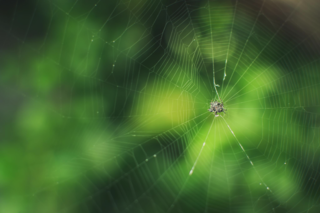It is common for a lot of people to be scared of, or have a phobia of, spiders. But, actually, spiders are beneficial insects, feeding on other insects that are of greater hazard to homes, families, and pets than spiders actually are. They may look scary to some of us but spiders are actually useful to us.
For those of us petrified of the eight-legged creatures, we can’t stand being around them and resort to getting rid of them however we can. If you want spiders out of your home, there are things which you can do:
Indoor Spider Control
Try to vacuum in corners of floors and along window sills, your gas fireplace, and in the attic, and basement to get rid of spiders, eggs and webs. Empty the vacuum and discard contents outdoors.
Sweep (or vacuum) cobwebs from ceilings, corners, and other areas on a regular basis.
Clear unwanted, unnecessary items such as unworn clothing, papers, and other unused items.
Keep stored boxes up off the floor, away from walls, and seal with tape to make them less attractive.
Check outdoor items before bringing them indoors.
Outdoor Spider Control
Regularly brush or vacuum spiders and webs off the outside of the home. This will not only help to eliminate spiders but will keep egg sacs from hatching and baby spiders from moving indoors.
Remove all waste, and leaves from around the sides of buildings.
Examine for any holes or gaps in the foundation, around doors and windows, and around plumbing and utility lines. Close up cracks and crevices around windows, doors, and foundations, and fix and preserve screens to bar spider entry. This will also help to keep out other insects which are pests themselves and/or attract the spiders as food.
Check crawl spaces for humidity which can be a breeding ground for spiders. Placing plastic over uncovered soil or rising ventilation in the crawlspace can help correct a moisture concern.
Chemical Control of Spiders
Indoor use of insecticides hardly ever provides much rule of spiders because the spider must be sprayed directly to be affected; walking over a sprayed area at a later time will seldom if ever, cause a spider to die. If you choose to use an insecticide, decide on one that is specially labeled for spiders and read and follow all directions.
Outdoor use of insecticides does not supply long-term control. This is because, again, the spider must directly make contact with the pesticide, and other methods (as listed above) are preferable to use of pesticides. If you do use an insecticide, select one that is specifically labeled for spiders and read and follow all label directions.
Pest management professionals have access to other pesticides, that can supply long-term control when necessary. The dust particles will cling to spiders and insects that crawl across it, and cause their bodies to dry out. These are used for the most part in, cracks, wall voids and other sheltered, undisturbed areas where the spiders are likely to move.


